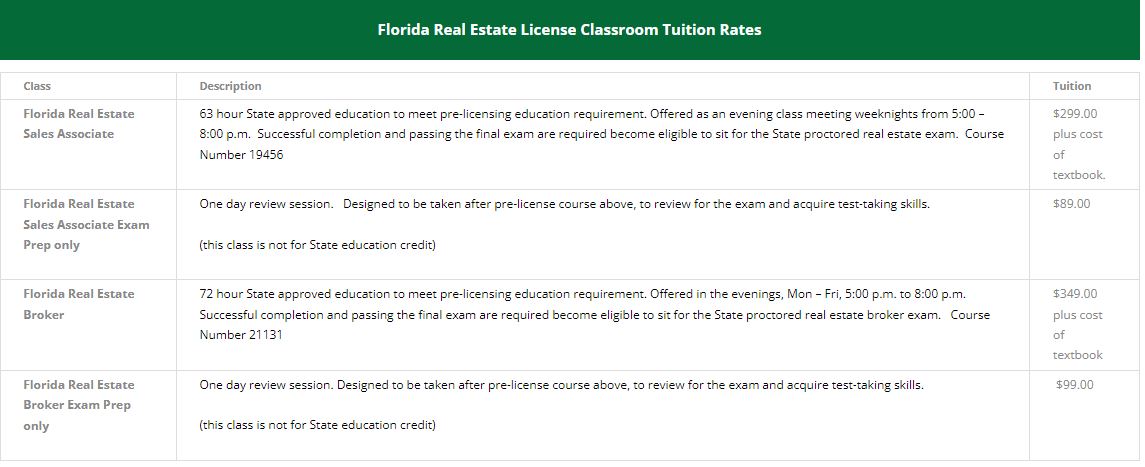
Before you can start working in real estate, you must first get a real estate license in California. There are some steps you should take. These include sending a fingerprint card to the Bureau of Real Estate. The next step is to find a school offering real estate training.
Courses required to get a real estate license in California
To obtain a California real-estate license, the first step is to complete pre-license courses. These courses must be taken in an accredited college. The Department of Real Estate maintains a list of accredited institutions. Online classes are also available. You should however be aware of the financial and time requirements.
The state's Department of Real Estate must approve the courses you take. AceableAgent is an approved online real estate school in California. The courses are constantly updated and are sometimes available at a discounted rate. Many students have found it difficult to follow the instructions and find it tedious.

Exam pass rate
There are many different ways to study for the real estate license exam. Your success depends on choosing the right program. It is important to ensure you get the most comprehensive program possible. You will also need to be able take quizzes and practice exams, as well as study material for your written exam. Some programs include audio and/or video training.
High pass rates are not uncommon in real estate schools. CE Shop boasts 91% pass rates. The courses they offer are updated with the most recent information. Many courses are also available at a discount. But, it is worth noting that the course materials might be difficult to comprehend. Many students find the course materials difficult to comprehend.
Pre-licensing requirements
The first step in obtaining a real estate license in California is completing a pre-licensing course. There are many online courses available that can prepare you for the real-estate exam. A great prep course will give you real-world scenarios and additional study material.
California requires that you complete at least one course in pre-licensing and 135 hours related coursework. On the California Department of Real Estate’s website, you can see how many hours of training you need.

Requirements for school
In California, students must complete at least one year of education prior to obtaining a real estate license. The course must have at least two core classes that total 135 hour. Real Estate Principles is one of the core courses. This course covers ethics, real estate law, and ethics. The second course covers financing, contracts, and escrow procedures. Students will also need to complete a listing course.
Students must also take core courses. A background check involves a live scan of criminal records. In order to be granted a license, you may have to reveal any criminal history. The state exam is difficult. However, many schools offer extra resources for students in preparation for the exam.
FAQ
What are the downsides to a fixed-rate loan?
Fixed-rate mortgages tend to have higher initial costs than adjustable rate mortgages. Also, if you decide to sell your home before the end of the term, you may face a steep loss due to the difference between the sale price and the outstanding balance.
Can I get a second loan?
Yes, but it's advisable to consult a professional when deciding whether or not to obtain one. A second mortgage is often used to consolidate existing loans or to finance home improvement projects.
How do I calculate my interest rate?
Market conditions influence the market and interest rates can change daily. The average interest rate for the past week was 4.39%. To calculate your interest rate, multiply the number of years you will be financing by the interest rate. For example: If you finance $200,000 over 20 year at 5% per annum, your interest rates are 0.05 x 20% 1% which equals ten base points.
What are the top three factors in buying a home?
The three most important things when buying any kind of home are size, price, or location. Location refers to where you want to live. Price refers to what you're willing to pay for the property. Size refers to how much space you need.
What is reverse mortgage?
A reverse mortgage is a way to borrow money from your home without having to put any equity into the property. This reverse mortgage allows you to take out funds from your home's equity and still live there. There are two types of reverse mortgages: the government-insured FHA and the conventional. You must repay the amount borrowed and pay an origination fee for a conventional reverse loan. FHA insurance covers repayments.
Statistics
- When it came to buying a home in 2015, experts predicted that mortgage rates would surpass five percent, yet interest rates remained below four percent. (fortunebuilders.com)
- 10 years ago, homeownership was nearly 70%. (fortunebuilders.com)
- Private mortgage insurance may be required for conventional loans when the borrower puts less than 20% down.4 FHA loans are mortgage loans issued by private lenders and backed by the federal government. (investopedia.com)
- The FHA sets its desirable debt-to-income ratio at 43%. (fortunebuilders.com)
- Based on your credit scores and other financial details, your lender offers you a 3.5% interest rate on loan. (investopedia.com)
External Links
How To
How to Find Houses to Rent
Renting houses is one of the most popular tasks for anyone who wants to move. However, finding the right house may take some time. Many factors affect your decision-making process when choosing a home. These factors include the location, size, number and amenities of the rooms, as well as price range.
To make sure you get the best possible deal, we recommend that you start looking for properties early. Consider asking family, friends, landlords, agents and property managers for their recommendations. This will ensure that you have many options.